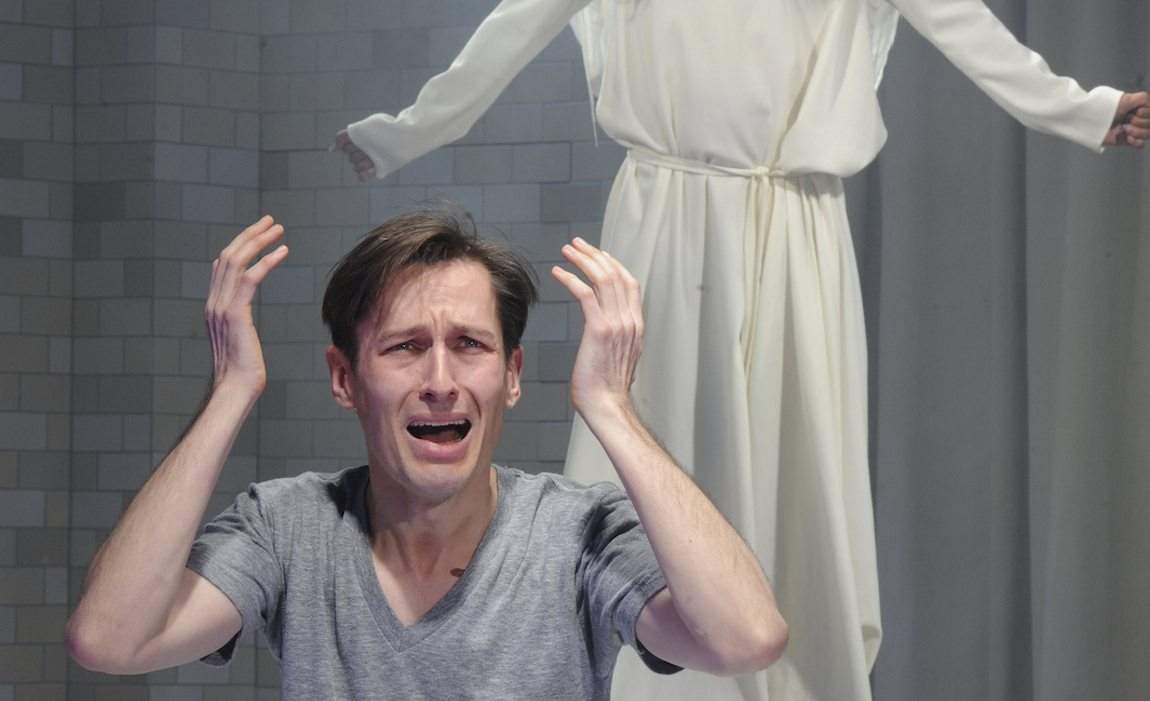Angels in America
The binge theatre experience you won't forget.
Overview
If you only see one play this year, make it two. Angels in America is an epic in two parts, Millennium Approaches and Perestroika, and Belvoir is putting them on in repertory, giving you the option of seeing both works back to back in one day. At some point, it ceases being theatre and becomes an event. It takes you past familiar experience and leaves you poised for something new and unforgettable.
The play itself, by Tony Kushner, is a landmark piece. When he wrote the first part in 1988, AIDS was the great unknown terror. It was one year earlier in Australia that an iconic PSA lodged the grim reaper firmly into our consciousness (terrifying, but part of an impressive and often grassroots education campaign that put Australia ahead of the curve for once). To write about the effect of AIDS on gay men at this time was explosively humanising, let alone to do it with such grandeur and perspective.
The play has since been an HBO series and an opera. It's won Tonys and a Pulitzer. It's almost too big to grasp, and yet its subtitle, A Gay Fantasia on National Themes, is a pretty accurate precis. Angels is what an American brand of magic realism might look like crossed with The West Wing. Its characters talk fast about big ideas while travelling to heaven to backchat their divine orders.
Prior Walter (Luke Mullins) is the chosen prophet. He's been diagnosed with AIDS, and after a truly wretched night of pain during which he's hospitalised, his partner, Louis Ironson (Mitchell Butel) leaves him. Louis cannot forgive himself for his act of abandonment, but he also can't go back. Despite the companionship of his friend Belize (DeObia Oparei, channelling Andre Leon Talley), Prior is mostly alone, making him prey to ghostly ancestors, unearthly voices and other phantoms affecting the heavily medicated (or the chosen ones).
Meanwhile, Roy Cohn (Marcus Graham) — a Republican power broker, McCarthyist prosecutor, libertarian ranter and all-round vile human being (who's quite real) — is diagnosed with AIDS, too, but he chooses to call it 'liver cancer' and quietly procures himself the latest treatments. His protege, fresh-faced young Mormon Jo Pitt (Ashley Zukerman), is also fighting to repress his sexuality, while his behaviour drives his fragile wife, Harper (Amber McMahon), to disconnect further from reality. As cute as they are to each other, when he does finally admit his feelings, she astral travels to Antartica in the arms of a friendly hallucination.
Angels in America is really all about these characters, whom you'll soon be willing to follow anywhere (even Ray, in a Joffrey-like sense), and the actors who bring them to life in front of you. Each performance is more flooring than the last, from the rawness and range of Mullins' Prior to the scary, constant intensity of Graham's Ray (through a combination of make-up/sheer force of will/audience imagination, they also genuinely seem to waste away over the course of the seven hour play, which is startling). Spread across several smaller roles, Robyn Nevin and Paula Arundell charm just as well — in fact, Nevin as Jo's Mormon mother and matronly Communist Ethel Rosenberg (deceased) carries off some of the show's most surprisingly tender moments. The parts were written for the actors to play across gender lines, and it remains a fun touch.
Director Eamon Flack is playful but fidelitious. There's fire, snow, blood, smoke and a showstopping special effect, but the production retains a sense of handmade creativity and openness. It asks the audience, play along.
The low-tech attitude stops at the set, by Michael Hankin. The guiding thought behind it seems to have been, 'how can we communicate the magnitude and un-temporariness of this production?' And the answer was, tile it, tile it all. Tile it so that ten bathrooms must go naked. Tile it so the audience is forced to imagine the drama of demolition. The glossy, beige-spectrum subway tile evokes the arteries of New York, but it also calls to mind bathrooms, hospitals and every situation in which the easy wiping off of fluids is valued. It's almost the maxi-minimalist set — a statement that simplicity is not a bludge. And in its capacity to make light dance, it's beautiful.
This might sound weird, but a seven-hour play is the perfect entertainment for our time. We've already proved we'll watch a season of TV in one sitting, and now any book or movie shaped liked TV — that is, episodically — is likely to fare well, too. Angels in America is such a story. It's not that it doesn't tax your wits; it's that characters you trust will be there to hold your hand when it does. Don't fear seven hours of theatre — go the binge.





